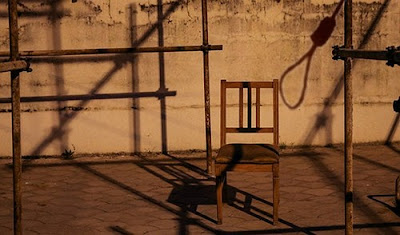 |
| Public hanging in Iran |
Examining the death penalty as currently imposed across the world leaves one glad to be living in the U.S. Nonetheless, the death penalty is still wrong.
WASHINGTON, March 27, 2016 — The debate about putting someone to death for committing a crime is an issue often raised in criminal justice conversations.
Regardless of which side of the discussion we take, we Americans have some sense as to which crimes are appropriate for death penalty consideration. Our laws and our public view is that murder is on that short list. Contrast our view with others around the world. Others elsewhere view life differently, sometimes considerably so.
There are also countries that will kill you if you are a homosexual or if you voice criticism against the government. In some countries you can be put to death if you are an adulterer or even if you are convicted of theft.
While the list of countries that allow and use the death penalty continues to decrease — as of July, 2015, according to Amnesty International (AI), 140 countries have legally abolished the death penalty or have effectively abolished it despite laws still on the books — what, in some countries, constitutes a crime that can trigger the death sentence is frequently unfathomable.
In the United States of America, being involved in the death of another person is almost a de facto prerequisite for getting the death penalty. Another death penalty crime is treason, which remains on the books in the Federal system and in some states as well.
Everyone in the U.S. who has been executed since the death penalty was reinstated in 1976 participated in a crime in which at least one victim died. In most of these cases, the individual executed directly killed the victim. A small number of death sentences have been carried out where the defendant ordered or contracted with another person to carry out a murder. Some death sentences have been carried out where the person executed participated in a felony during which a victim died at the hands of another participant in the felony.
Elsewhere around the world:
- Death sentences can follow convictions for homosexuality in Afghanistan, Brunei Iran, Iraq, Nigeria, Saudi Arabia, Somalia, Sudan, in the United Arab Emirates and in Yemen.
- Convictions for perjury and treason can result in death sentences in Algeria, Bahamas, Bangladesh, Barbados, Belarus, Botswana, Central African Republic, Cuba, Egypt, Ethiopia, Ghana, Guyana, Israel (high treason), Japan, Kenya, Laos, Libya, Nauru, North Korea, New Guinea, Peru, Saint Lucia, Sierra Leon, Singapore, South Sudan, Sudan, Swaziland, Syria, Tanzania, Tonga, Trinidad and Tobago, United Arab Emirates, the United States, Vietnam and Zambia.
- A conviction for espionage can result in death in Algeria, Cameroon, Central African Republic, Iran, Peru, Qatar, the United States, Vietnam and Syria.
- Corruption is a death penalty crime in China, Cuba and Iran.
- Fraud is a death penalty offense in China and Vietnam.
- Stealing something can get you executed in Algeria, North Korea, Saudi Arabia and Syria.
- Adultery can result in the death penalty in Brunei, Saudi Arabia, Somalia, Yemen and Syria.
- A woman and her two daughters are being held in Papua, New Guinea on charges of sorcery. The death sentence may follow if they are convicted.
- Last November a Saudi Arabian court sentenced a Palestinian poet to death for apostasy, defined as the act of abandoning his Muslim faith.
- Saudi Arabia (AI reports) continues to impose the death sentence on individuals under the age of 18, violating child human rights laws.
But the death sentence cannot be justified.
Around the world, some countries with absurdly unfair justice systems (such as China, Iran, Iraq) employ the death sentence after conducting unfair trials, when “confessions” are extracted through torture, and to punish political opponents. The death penalty in such countries is often used as a tool of repression, a quick way to silence political opposition. Frequently, those accused do not have lawyers representing them.
It is discriminatory, particularly in the United States, when being poor or being a member of an ethnic or a religious minority is much more likely to result in a death sentence. This fact is the result of still blatant discrimination as well societal factors. Poor people and those in marginalized groups have less access to the legal resources that are necessary for them to defend themselves.
Source: CDN, Paul Samakow, March 27, 2016. Paul A. Samakow is an attorney licensed in Maryland and Virginia, and has been practicing since 1980.










